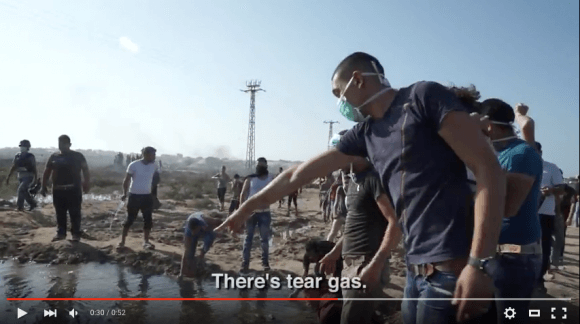On Friday, October 16th, Israeli soldiers again opened fire across the Gaza border with live ammunition and copious amounts of tear gas on Palestinian youth demonstrators.
Amid the chaos, some thirsty protesters at the Nahal Oz demonstration east of Gaza City came across a leaking (what appeared to be faulty) freshwater pipe that is owned and operated by the Israeli company Mekorot.
A primary actor in the colonization of Palestinian water resources, Mekorot sells inadequate amounts of water to Gaza as collective punishment for electing Hamas, intentionally creating a constant crisis. Earlier this year, Mekorot decided to increase the water supply to Gaza, not out of good will, but because relations between Hamas and Israel have normalized considerably since their 2007 takeover. But this massive increase, which is still inadequate, demonstrates the arbitrary nature of the water shortage.
Mekorot’s Vice President of Engineering, Avraham Ben-Yosef, then told Ynet News, “Several years ago we laid the line near the fence on purpose in order to give the Palestinians the increment. With the rise of Hamas contact was cut off and only recently have conditions become ripe to supply them the water.”
Supplies of water, electricity, fuel and building materials are constantly in flux. The Israeli siege has dried up Gaza and military assaults have devastated the water infrastructure and exacerbated the crisis. Over pumping has led to intrusion of seawater into groundwater aquifers, and public health officials in Gaza worry about the possibility of chemical contamination from Israeli weapons. In place of water available to the public, Palestinians in Gaza have no choice but to purchase potable water from private vendors.
With no water available at the Nahal Oz border protest, a few of the protesters were able to quench their thirst. However, they quickly realized, a tear gas canister fired by Israeli soldiers a few dozens meters away was floating in the water. Some were undeterred by the presence of noxious chemicals and drank the water anyway.
While this video is probably not the most shocking piece of footage I captured that day, it might be the most instructive.
Of the two dozen or so protesters I’ve interviewed, all of them speak of occupation, the West Bank and Al-Aqsa (not one of them mentioned that they were inspired to protest because of social media, as Jodi Rudoren would have us believe). Without a doubt, occupation is, first and foremost, why these young men are risking their lives to protest in front of the Israeli soldiers killing them with impunity. What these young men and boys do not mention, however, is the fact that few of them have ever seen fresh water run from their faucets. When they bathe, they are left with the slimy feeling on their skin and salty aftertaste of saltwater. They are protesting against sitting in the dark, unable to turn on a light. They are protesting being trapped in Gaza, with no future. They are protesting against their homes remaining tidied up piles of mass-destruction. They are protesting against being forced to live in the rubble where they dug their family members’ bodies out. They are protesting the failure of the Palestinian unity government and the success of Israel’s divide-and-conquer strategy. Above all, they are protesting daily injustice, and the world’s collective failure to act.



“Israeli soldiers again opened fire”
Interestingly, many people, focused on the West-Bank arena, failed to notice that in the Gaza border Israel acted far more strongly –doing it does not do the West-Bank. That may look surprising – after all the West-Bank events are “closer to home”. But there is a rationale here: The west-Bank is already seen by Israel, even if it is not so officially, as a de-facto part of Israel while Gaza is not so.
That is also why what is reported here about all the many grievances of the Gazans is already not on the radar screen in Israel – it happens in another country. The proximity to Israel only means that there could be inter-country clashes, even full wars, but everything else there is treated as those in Iraq or Syria, or Libya or Yemen,… – maybe bad but not anymore our concern.